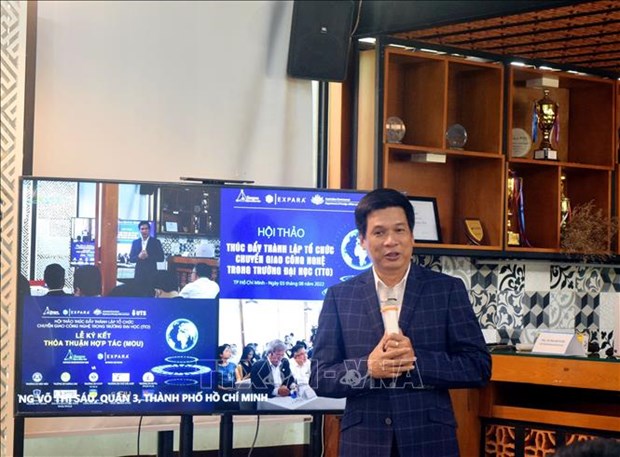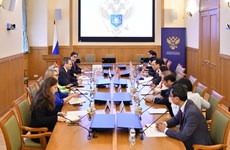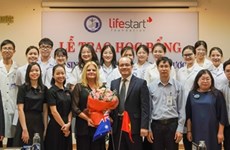HCM City seeks to boost technology transfer from universities
Huynh Kim Tuoc, managing director of the Saigon Innovation Hub's (SiHub) Start-up Support Centre under the HCM City Department of Science and Technology, affirmed Vietnam holds tremendous potential for technology development and transfer thanks to its highly qualified experts and intellectuals with rich experiences in this field, especially young and talented human resources at universities.
 Huynh Kim Tuoc, managing director of the Saigon Innovation Hub's (SiHub) Start-up Support Centre under the HCM City Department of Science and Technology, speaks at the event. (Photo: VNA)
Huynh Kim Tuoc, managing director of the Saigon Innovation Hub's (SiHub) Start-up Support Centre under the HCM City Department of Science and Technology, speaks at the event. (Photo: VNA)Tuoc said that at a recent workshop in Ho Chi Minh City on promoting the establishment of technology transfer offices (TTOs) in universities, which was co-organised by SiHub, Australia's University of Technology Sydney (UTS) and Singapore's leading incubator fund Expara.
The workshop attracted a large number of domestic and foreign experts, and representatives of universities in the southern provinces and cities to exchange, discuss and assess the current situation, advantages, difficulties and challenges as well as propose effective models and solutions that bring practical benefits from the establishment of technology transfer offices at universities.
Over the past 50 years, Vietnam has focused its resources on training and research, but has not developed commercialisation of research and inventions.
SiHub now has about 300,000 technology research projects at universities nationwide and a network of 100,000 technology firms based around the world, Tuoc said.
“The commercialisation of the universities’ inventions and products in the country is expected to be developed in the future”, he said.
The centre focuses on promoting the development of existing potential in technology development at universities, he said.
It is choosing universities to consult, build processes and organise apparatus to establish technology transfer in order to commercialise research and invention that bring economic value.
Douglas Abrams, founder and CEO of Expara, said Vietnam has great potential for high quality human resources and entrepreneurial spirit that can make significant contributions to the country's technology development.
Intellectual assets from universities and research institutes are the foundation to support start-ups, he said.
“The role of universities is to connect potential ideas, build strong teams, and interact with businesses to successfully conduct commercialisation,” he said.
Nguyen Diep from UTS said the university’s technology transfer model is being deployed to many partners.
“The number of inventions of universities in Vietnam is still very low compared to universities in Thailand and Singapore, but they have a lot of potential,” he said.
Experts pointed out many challenges of technology transfer and commercialisation such as the science and technology ecosystem does not have a clear orientation, with low connectivity and interaction.
They agreed that local universities need to be more active in participating in technology transfer activities, promote both quantity and quality of inventions, and build a technology transfer ecosystem with the participation of businesses.
It also needs to enhance the legal framework, develop technical and financial infrastructure, and promote creativity and innovation capacity, capacity in management and investment in universities, they said.
Many successful models of commercialising university research were introduced at the workshop, such as TTO of TNG Holdings Vietnam and the Saigon High-Tech Park's High-tech Business Incubation Centre.
On this occasion, SiHub, UTS, Expara and universities in the southern region signed cooperation agreements to promote technology transfer activities in the following years./.













